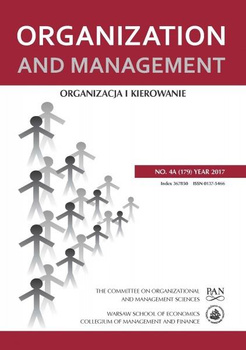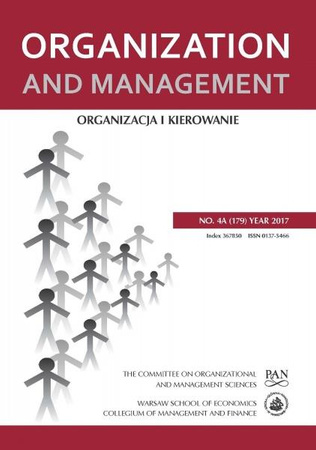
Submitting the English-language edition of our magazine, we hope you will read it in the festive atmosphere of Christmas and the New Year.
The current issue of our Quarterly concerns several contemporary topics such as: organizational behavior of enterprises and relational capital, innovation strategy and organizational performance, cognitive proximity, organizational growth problems, and competitiveness of trade companies.
The study by Patrycja Klimas deals with cognitive proximity which can be perceived through employees using the same language (jargon), scientific standards and technological formal codes. The author clearly indicates that based on the review, synthesis and integration of prior findings, it is justified to perceive cognitive proximity as a multidimensional construct including four components related to inter-organizational similarity of: mental models, technology, knowledge, and environmental conditions.
Wioletta Mierzejewska presents the results of quantitative empirical research on the configuration of holdings and on the relation between their configuration and economic performance. Based on the conducted research, the author argues that complexity of a holding is strongly connected to its management system.
Maciej Czarnecki undertook a research on the determinants of the organizational growth problems. It shows that the dynamics of organizational growth problems is positively correlated with the increase in both sales and employment figures.
Marcin Soniewicki analyzed the sources of knowledge used by commercial companies in order to improve their competitiveness. The results of these studies indicate that these companies most intensively used market related knowledge sources, like: customers, suppliers and competitors. Very important for this type of firms are also publications, external trainings and market research.
A research team composed of Katarzyna Tworek, Katarzyna Walecka-Jankowska, Anna Zgrzywa-Ziemak, Marian Hopej and Robert Kamiński presented in the article the results of empirical study on organizational culture. The results of these studies
indicate that organizational culture stands as yet another instrument of coordination - so far generally overlooked in the literature. The presented reflections lead to formulation of the concept of a culture of co-operation as a key to simplifying organizational structures.
In the first article Beata Skowron-Grabowska focuses on organizational behavior of enterprises and relational capital. The author assumes that relational capital has become a significant element in the business activities of enterprises that are subject to the challenges of a competitive market. In the paper, relational capital was acknowledged to be an important resource in the strategies of enterprises. Indicating the significance of organizational behavior in terms of various aspects requires the inclusion of organizational culture in the discussed matters.
In order to increase quality of our Quarterly, we would like to present our Writers a New Quality Standards Policy which we present in an acknowledgement part. We kindly asked our Writers to get acquainted with them.
Wishing you Merry Christmas and a Happy New Year, I hope you will achieve many successes in your professional and personal life!
Maciej Urbaniak
[[[separator]]]
Maciej Urbaniak
PREFACE
Patrycja Klimas
SUMMARISING THE VIEWS ON COGNITIVE PROXIMITY IN COOPERATION AND NETWORKING PROCESSES
BLISKOŚĆ POZNAWCZA W PROCESIE WSPÓŁPRACY MIĘDZYORGANIZACYJNEJ - WNIOSKI Z ANALIZY, INTEGRACJI I SYNTEZY WIEDZY DOTYCHCZASOWEJ
Wioletta Mierzejewska
BUSINESS GROUPS CONFIGURATION AND ITS CHANGES DURING A CRISIS
KONFIGURACJA STRUKTURALNA GRUP KAPITAŁOWYCH I JEJ ZMIANY POPODCZAS KRYZYSU
Maciej Czarnecki
ORGANISATIONAL GROWTH PROBLEMS - THE CONSTRUCT AND ITS EMPIRICAL EXAMINATION
ORGANIZACYJNE PROBLEMY WZROSTU - KONSTRUKT I JEGO EMPIRYCZNA WERYFIKACJA
Marcin Soniewicki
COMPETITIVENESS OF TRADING COMPANIES - THE ROLE OF SELECTED KNOWLEDGE SOURCES
KONKURENCYJNOŚĆ PRZEDSIĘBIORSTW HANDLOWYCH - ROLA WYBRANYCH ŹRÓDEŁ WIEDZY
Marian Hopej, Robert Kamiński, Katarzyna Tworek, Katarzyna Walecka-Jankowska, Anna Zgrzywa-Ziemak
COMMUNITY-ORIENTED CULTURE AND SIMPLE ORGANIZATIONAL STRUCTURE
KULTURA WSPÓŁDZIAŁANIA I PROSTOTA STRUKTUR ORGANIZACYJNYCH
Beata Skowron-Grabowska
ORGANIZATIONAL BEHAVIOR OF ENTERPRISES AND RELATIONAL CAPITAL
ZACHOWANIA ORGANIZACYJNE PRZEDSIĘBIORSTW A KAPITAŁ RELACYJNY
THE COMMITTEE ON ORGANIZATIONAL AND MANAGEMENT SCIENCES POLISH ACADEMY OF SCIENCE
WARSAW SCHOOL OF ECONOMICS
ACKNOWLEDGEMENTS
Opis
Wstęp
Submitting the English-language edition of our magazine, we hope you will read it in the festive atmosphere of Christmas and the New Year.
The current issue of our Quarterly concerns several contemporary topics such as: organizational behavior of enterprises and relational capital, innovation strategy and organizational performance, cognitive proximity, organizational growth problems, and competitiveness of trade companies.
The study by Patrycja Klimas deals with cognitive proximity which can be perceived through employees using the same language (jargon), scientific standards and technological formal codes. The author clearly indicates that based on the review, synthesis and integration of prior findings, it is justified to perceive cognitive proximity as a multidimensional construct including four components related to inter-organizational similarity of: mental models, technology, knowledge, and environmental conditions.
Wioletta Mierzejewska presents the results of quantitative empirical research on the configuration of holdings and on the relation between their configuration and economic performance. Based on the conducted research, the author argues that complexity of a holding is strongly connected to its management system.
Maciej Czarnecki undertook a research on the determinants of the organizational growth problems. It shows that the dynamics of organizational growth problems is positively correlated with the increase in both sales and employment figures.
Marcin Soniewicki analyzed the sources of knowledge used by commercial companies in order to improve their competitiveness. The results of these studies indicate that these companies most intensively used market related knowledge sources, like: customers, suppliers and competitors. Very important for this type of firms are also publications, external trainings and market research.
A research team composed of Katarzyna Tworek, Katarzyna Walecka-Jankowska, Anna Zgrzywa-Ziemak, Marian Hopej and Robert Kamiński presented in the article the results of empirical study on organizational culture. The results of these studies
indicate that organizational culture stands as yet another instrument of coordination - so far generally overlooked in the literature. The presented reflections lead to formulation of the concept of a culture of co-operation as a key to simplifying organizational structures.
In the first article Beata Skowron-Grabowska focuses on organizational behavior of enterprises and relational capital. The author assumes that relational capital has become a significant element in the business activities of enterprises that are subject to the challenges of a competitive market. In the paper, relational capital was acknowledged to be an important resource in the strategies of enterprises. Indicating the significance of organizational behavior in terms of various aspects requires the inclusion of organizational culture in the discussed matters.
In order to increase quality of our Quarterly, we would like to present our Writers a New Quality Standards Policy which we present in an acknowledgement part. We kindly asked our Writers to get acquainted with them.
Wishing you Merry Christmas and a Happy New Year, I hope you will achieve many successes in your professional and personal life!
Maciej Urbaniak
Spis treści
Maciej Urbaniak
PREFACE
Patrycja Klimas
SUMMARISING THE VIEWS ON COGNITIVE PROXIMITY IN COOPERATION AND NETWORKING PROCESSES
BLISKOŚĆ POZNAWCZA W PROCESIE WSPÓŁPRACY MIĘDZYORGANIZACYJNEJ - WNIOSKI Z ANALIZY, INTEGRACJI I SYNTEZY WIEDZY DOTYCHCZASOWEJ
Wioletta Mierzejewska
BUSINESS GROUPS CONFIGURATION AND ITS CHANGES DURING A CRISIS
KONFIGURACJA STRUKTURALNA GRUP KAPITAŁOWYCH I JEJ ZMIANY POPODCZAS KRYZYSU
Maciej Czarnecki
ORGANISATIONAL GROWTH PROBLEMS - THE CONSTRUCT AND ITS EMPIRICAL EXAMINATION
ORGANIZACYJNE PROBLEMY WZROSTU - KONSTRUKT I JEGO EMPIRYCZNA WERYFIKACJA
Marcin Soniewicki
COMPETITIVENESS OF TRADING COMPANIES - THE ROLE OF SELECTED KNOWLEDGE SOURCES
KONKURENCYJNOŚĆ PRZEDSIĘBIORSTW HANDLOWYCH - ROLA WYBRANYCH ŹRÓDEŁ WIEDZY
Marian Hopej, Robert Kamiński, Katarzyna Tworek, Katarzyna Walecka-Jankowska, Anna Zgrzywa-Ziemak
COMMUNITY-ORIENTED CULTURE AND SIMPLE ORGANIZATIONAL STRUCTURE
KULTURA WSPÓŁDZIAŁANIA I PROSTOTA STRUKTUR ORGANIZACYJNYCH
Beata Skowron-Grabowska
ORGANIZATIONAL BEHAVIOR OF ENTERPRISES AND RELATIONAL CAPITAL
ZACHOWANIA ORGANIZACYJNE PRZEDSIĘBIORSTW A KAPITAŁ RELACYJNY
THE COMMITTEE ON ORGANIZATIONAL AND MANAGEMENT SCIENCES POLISH ACADEMY OF SCIENCE
WARSAW SCHOOL OF ECONOMICS
ACKNOWLEDGEMENTS
Opinie
Submitting the English-language edition of our magazine, we hope you will read it in the festive atmosphere of Christmas and the New Year.
The current issue of our Quarterly concerns several contemporary topics such as: organizational behavior of enterprises and relational capital, innovation strategy and organizational performance, cognitive proximity, organizational growth problems, and competitiveness of trade companies.
The study by Patrycja Klimas deals with cognitive proximity which can be perceived through employees using the same language (jargon), scientific standards and technological formal codes. The author clearly indicates that based on the review, synthesis and integration of prior findings, it is justified to perceive cognitive proximity as a multidimensional construct including four components related to inter-organizational similarity of: mental models, technology, knowledge, and environmental conditions.
Wioletta Mierzejewska presents the results of quantitative empirical research on the configuration of holdings and on the relation between their configuration and economic performance. Based on the conducted research, the author argues that complexity of a holding is strongly connected to its management system.
Maciej Czarnecki undertook a research on the determinants of the organizational growth problems. It shows that the dynamics of organizational growth problems is positively correlated with the increase in both sales and employment figures.
Marcin Soniewicki analyzed the sources of knowledge used by commercial companies in order to improve their competitiveness. The results of these studies indicate that these companies most intensively used market related knowledge sources, like: customers, suppliers and competitors. Very important for this type of firms are also publications, external trainings and market research.
A research team composed of Katarzyna Tworek, Katarzyna Walecka-Jankowska, Anna Zgrzywa-Ziemak, Marian Hopej and Robert Kamiński presented in the article the results of empirical study on organizational culture. The results of these studies
indicate that organizational culture stands as yet another instrument of coordination - so far generally overlooked in the literature. The presented reflections lead to formulation of the concept of a culture of co-operation as a key to simplifying organizational structures.
In the first article Beata Skowron-Grabowska focuses on organizational behavior of enterprises and relational capital. The author assumes that relational capital has become a significant element in the business activities of enterprises that are subject to the challenges of a competitive market. In the paper, relational capital was acknowledged to be an important resource in the strategies of enterprises. Indicating the significance of organizational behavior in terms of various aspects requires the inclusion of organizational culture in the discussed matters.
In order to increase quality of our Quarterly, we would like to present our Writers a New Quality Standards Policy which we present in an acknowledgement part. We kindly asked our Writers to get acquainted with them.
Wishing you Merry Christmas and a Happy New Year, I hope you will achieve many successes in your professional and personal life!
Maciej Urbaniak
Maciej Urbaniak
PREFACE
Patrycja Klimas
SUMMARISING THE VIEWS ON COGNITIVE PROXIMITY IN COOPERATION AND NETWORKING PROCESSES
BLISKOŚĆ POZNAWCZA W PROCESIE WSPÓŁPRACY MIĘDZYORGANIZACYJNEJ - WNIOSKI Z ANALIZY, INTEGRACJI I SYNTEZY WIEDZY DOTYCHCZASOWEJ
Wioletta Mierzejewska
BUSINESS GROUPS CONFIGURATION AND ITS CHANGES DURING A CRISIS
KONFIGURACJA STRUKTURALNA GRUP KAPITAŁOWYCH I JEJ ZMIANY POPODCZAS KRYZYSU
Maciej Czarnecki
ORGANISATIONAL GROWTH PROBLEMS - THE CONSTRUCT AND ITS EMPIRICAL EXAMINATION
ORGANIZACYJNE PROBLEMY WZROSTU - KONSTRUKT I JEGO EMPIRYCZNA WERYFIKACJA
Marcin Soniewicki
COMPETITIVENESS OF TRADING COMPANIES - THE ROLE OF SELECTED KNOWLEDGE SOURCES
KONKURENCYJNOŚĆ PRZEDSIĘBIORSTW HANDLOWYCH - ROLA WYBRANYCH ŹRÓDEŁ WIEDZY
Marian Hopej, Robert Kamiński, Katarzyna Tworek, Katarzyna Walecka-Jankowska, Anna Zgrzywa-Ziemak
COMMUNITY-ORIENTED CULTURE AND SIMPLE ORGANIZATIONAL STRUCTURE
KULTURA WSPÓŁDZIAŁANIA I PROSTOTA STRUKTUR ORGANIZACYJNYCH
Beata Skowron-Grabowska
ORGANIZATIONAL BEHAVIOR OF ENTERPRISES AND RELATIONAL CAPITAL
ZACHOWANIA ORGANIZACYJNE PRZEDSIĘBIORSTW A KAPITAŁ RELACYJNY
THE COMMITTEE ON ORGANIZATIONAL AND MANAGEMENT SCIENCES POLISH ACADEMY OF SCIENCE
WARSAW SCHOOL OF ECONOMICS
ACKNOWLEDGEMENTS

